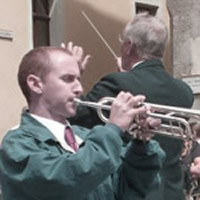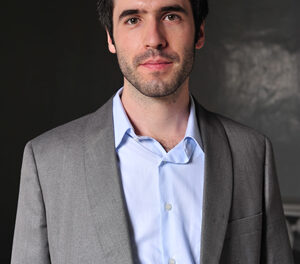Sales of Anne Frank’s famous Diary of a Young Girl, fueled by public school and Sunday school curriculums, have been on autopilot for decades, streaming steadily as part of a cultural reflex – since the slim volume has long since been universally acknowledged as the go-to primer for Holocaust studies. While I attended yeshivas in New York at both the grade-school and high school levels, you may be surprised to hear that I never read the book myself until I taught a Sunday school down in Columbia, SC, though I’d seen the film on numerous occasions. Was it Anne’s propensity for scribbling in her diary during the holy Sabbath that made studying her story off limits for my Orthodox educators, or was it her adolescent hormones? Surely it wasn’t any fear that the Diary delivers an overpowering exposure to the horrors of the Holocaust. Considerable fortification of the lesson plan would be necessary to make that a risk.
Children’s Theatre of Charlotte does it more forcefully than any company I know. In 1996, when they were still located in a converted VFW building, they re-designed their lobby as a fenced-in patch of a concentration camp. Parents and their children filed into that production of The Diary of Anne Frank through the barbed-wire enclosure, while actors dressed up as Nazi guards taunted and barked orders at them from the other side of the fence, their ferocity augmented by the recorded sounds of attack dogs. Now in their new home at ImaginOn, Children’s Theatre is presenting And Then They Came for Me: Remembering the World of Anne Frank. Built around the filmed reminiscences of Eva Schloss and Ed Silverberg, two Holocaust survivors who knew Anne, James Still’s script takes us outside the Franks’ secret annex in Amsterdam. We follow Ed as he escapes into Belgium after he’s apprehended by SS thugs for violating the Jewish curfew during the Nazi occupation. More harrowing, we join Eva and her family as they’re rooted out of hiding, packed into a stifling cattle car, and dropped into the bowels of the notorious Auschwitz death camp.
Still has chosen his people wisely, for Schloss’ and Silverberg’s stories both circle back to Anne long after fate has separated them. Ed is referred to as Hello in Anne’s diary, the writer’s first boyfriend. Of course, he didn’t learn what his teenage heartthrob had written about him until after the war, and while he and the family he raised now live in Hackensack, New Jersey, he still wonders what might have been. Eva and her mother Elfriede were the only family members to survive Auschwitz, so Eva became Otto Frank’s stepdaughter when he married her mother after the war.
Besides interacting with clips of the Schloss and Silverberg interviews, the four players in this exceptional Children’s Theatre cast cover nine roles. Under Mark Sutton’s direction, there is plenty of additional video to help evoke the various scenes along the way – from Amsterdam to the gates of Auschwitz and beyond, including a brief shot of a pile of spindly corpses after they emerged from the gas. Yet with all the doubling and the intricate technical coordination, the 69-minute production ran smoothly and simply at ImaginOn’s smaller Wachovia Playhouse venue, The intimacy of the space and the Spartan presentation only enhanced the visceral impact.
Chaz Pofahl and Nicia Carla carried most of the storyline as Ed and Eva, often finishing the sentences begun on the projection screen by their elder counterparts and transitioning us into the dark world of the play. Sutton’s doubling device also connected the two plot strands, which separate as soon as Eva’s family goes into hiding, for there is Pofahl playing Eva’s father and, sure enough, Carla doubles as Ed’s mom. Eluding capture and incarceration, Ed is more the adventure hero, so Carla’s role as Eva – the victim – inevitably touches us more deeply. We must partly imagine the dehumanization that overtakes her and her mother at Auschwitz, but there’s carefully chosen black-and-white footage to connect some of the dots. After the notorious showering and tattooing that marks the admission process, Carla emerged from the wings with nearly all her hair gone, a visual exclamation point stamped on her humiliation.
Emily Johnson sweetly and vivaciously portrays Anne Frank, occasionally reciting the words from the diary and occasionally recreating the fleeting moments she had with Ed before her family’s staged disappearance. There’s only one evil voice in the script, but again the playwright has chosen tellingly: it’s a boy who might be the same age as Anne! Yes, between stints as Ed’s father and Eva’s brother, Berry Newkirk makes his most indelible impression as a Hitler Youth. Newkirk’s unquestioning embrace of Nazi ideology, compounded by the proud and pure enthusiasm of his oft-repeated “Heil, Hitler!” serve as a chilling reminder that the battalions of Hitler Youth were as warped a creation as the fabled Nazi lampshades made from human flesh.
I did find myself stealing looks at my wife, a former grade-school teacher, and wondering if the recommended age range of 10-and-up was really the right recommendation. She assured me that her Holocaust lesson plans hit even harder. I’d say this is more than hard enough. Returning to the nearby parking garage, we happened to share the elevator with a mother and her daughter, a kid who didn’t look like she had crossed that 10-year-old threshold very long ago. Both the mother and the child were silent as we ascended to the third floor, but the daughter especially caught my attention, staring downward desolately in a state that may have been shock. She hadn’t spent the last 69 minutes at a picnic, that’s for certain. And Then They Came for Me was likely a transformative experience for them both. Maybe all of us were thinking a little bit about that cattle car when the elevator doors closed.
This production runs through March 13. For details, see the sidebar.












